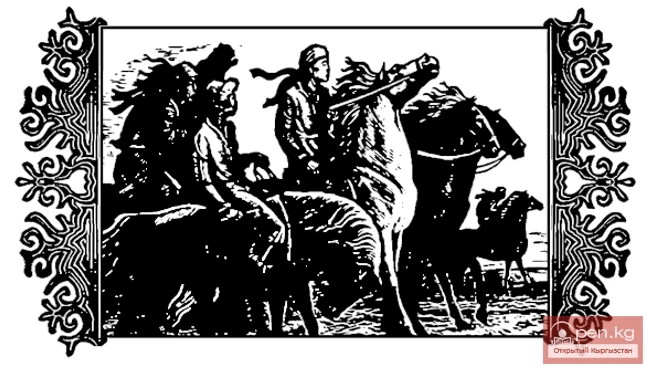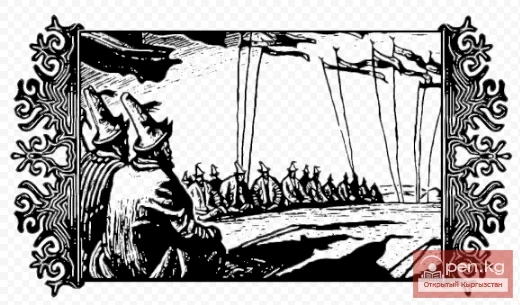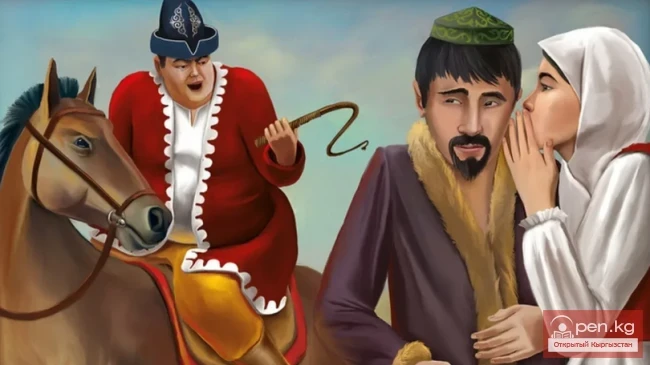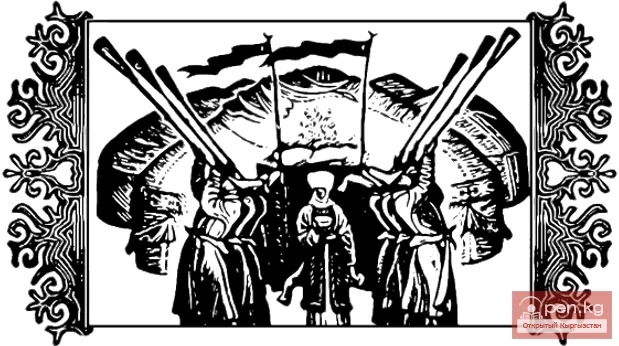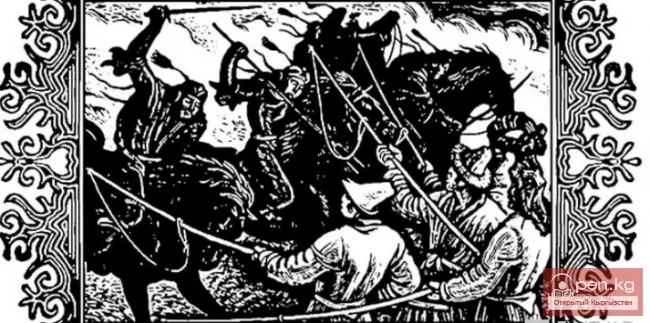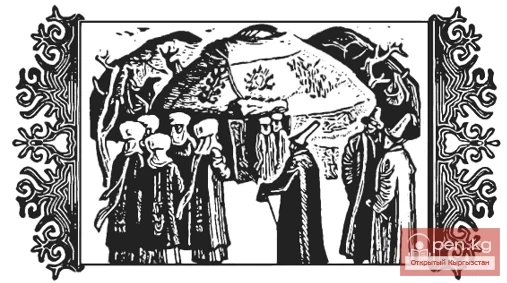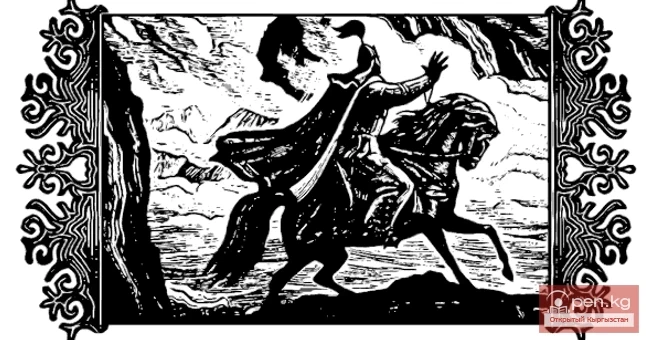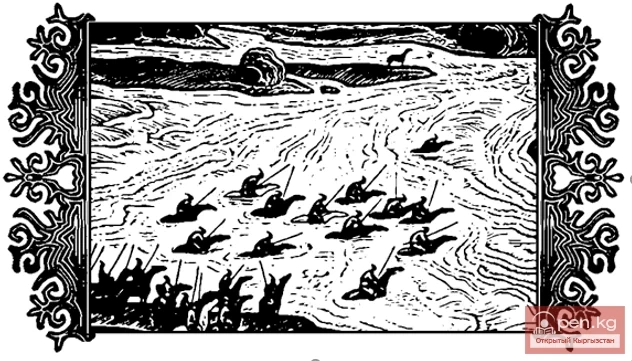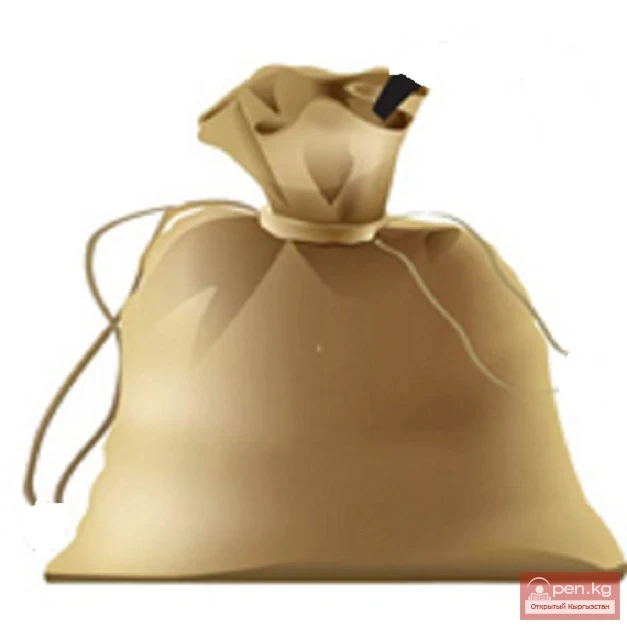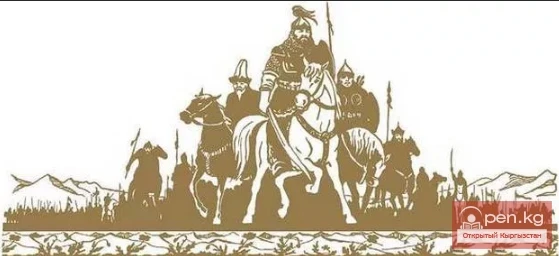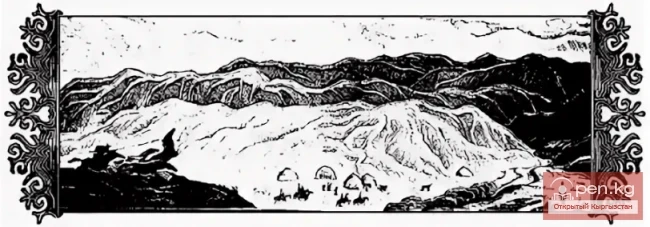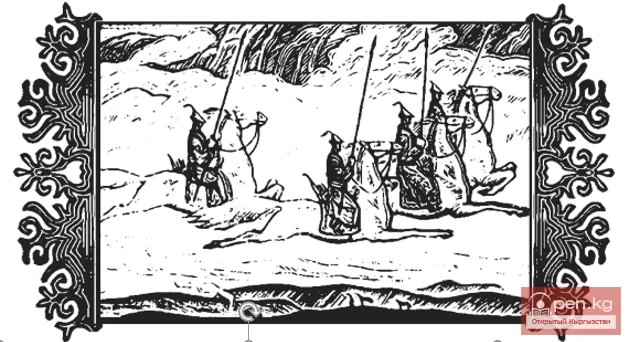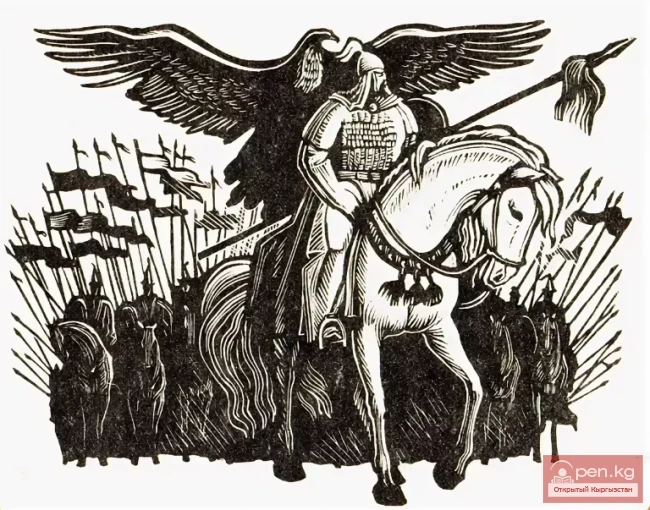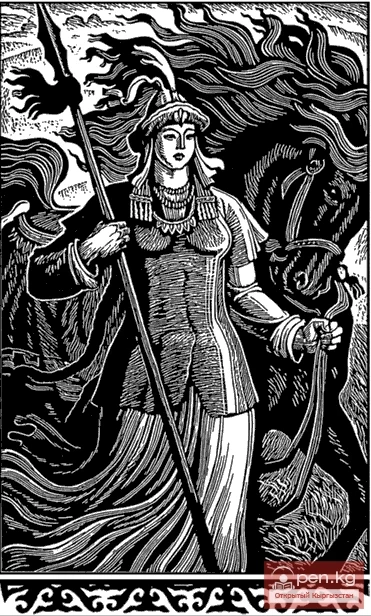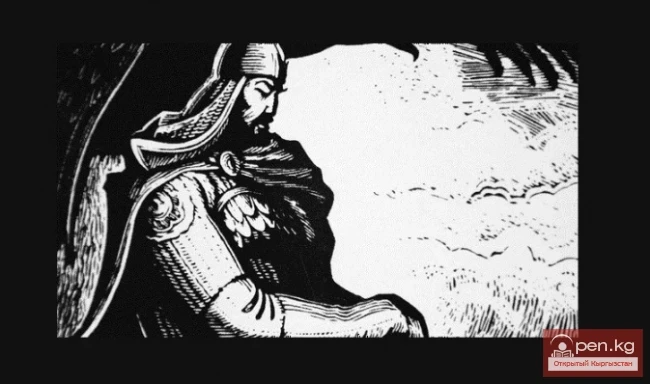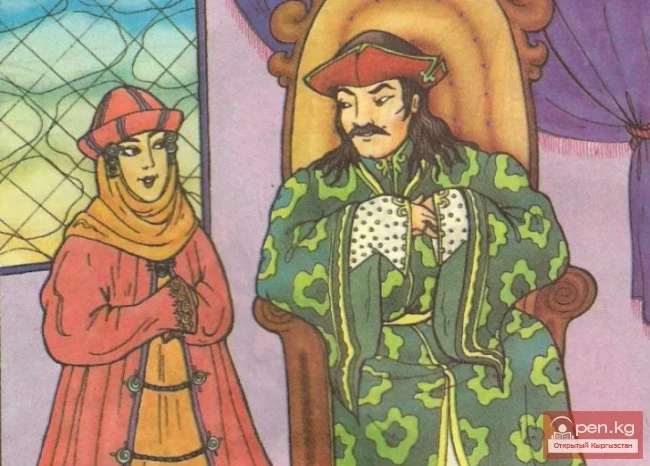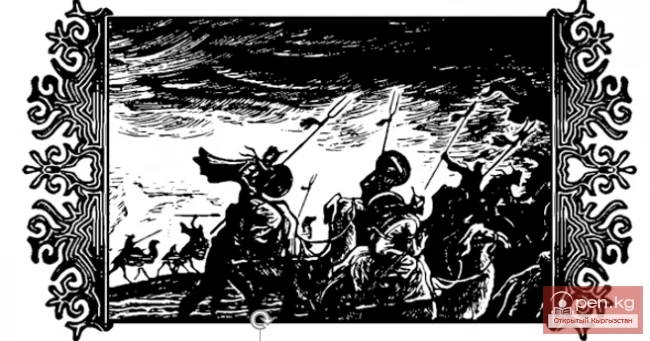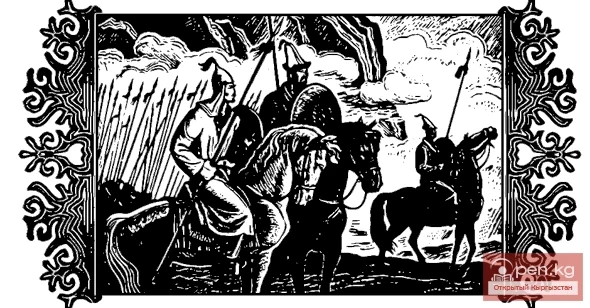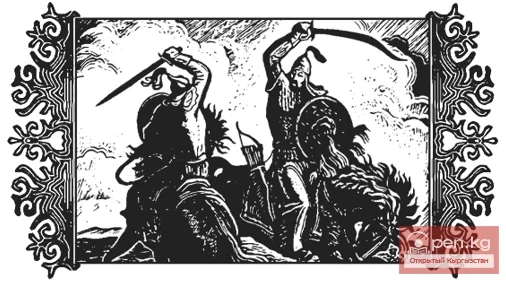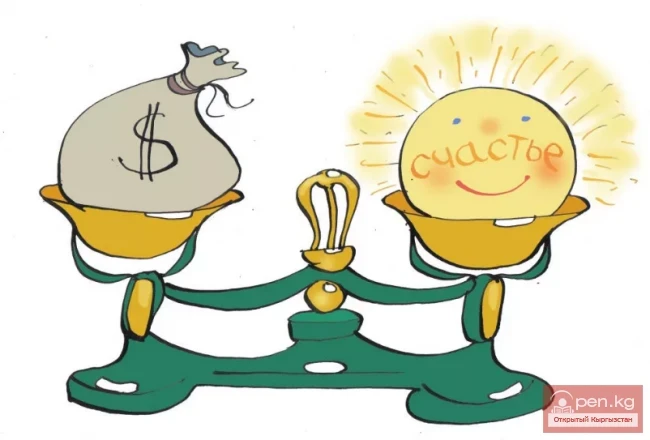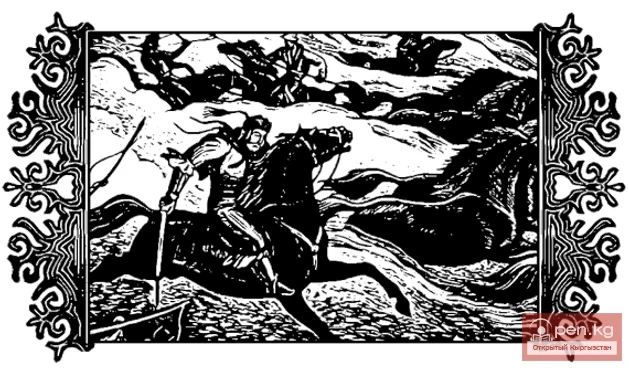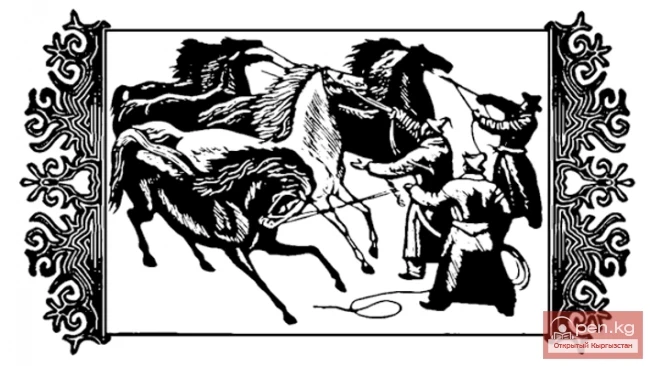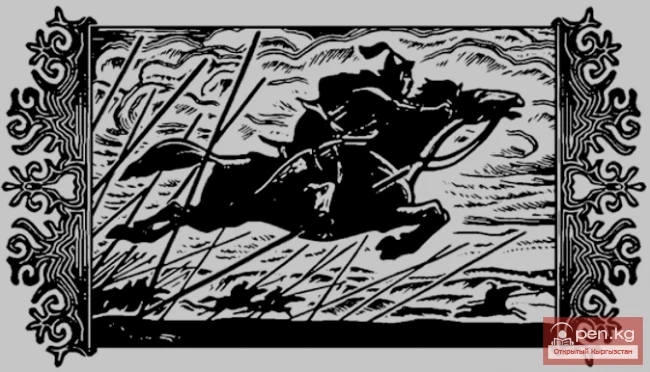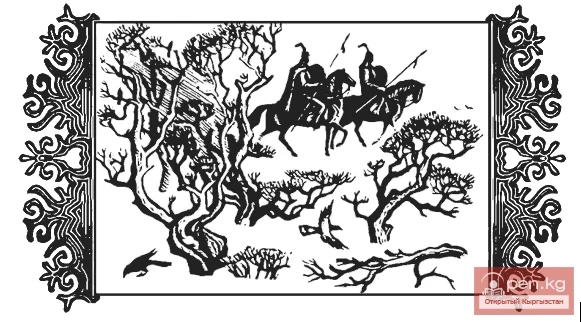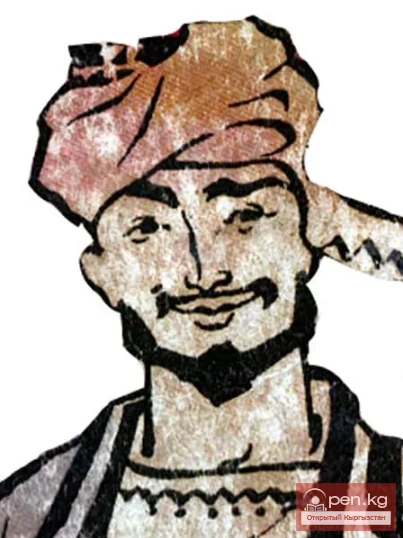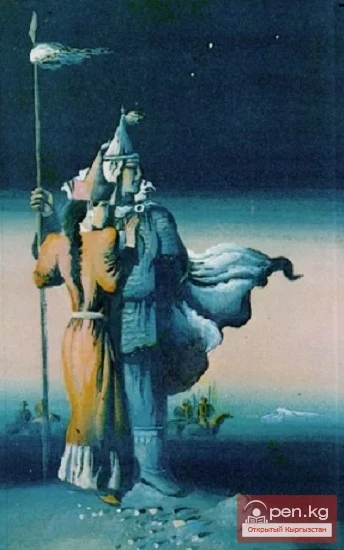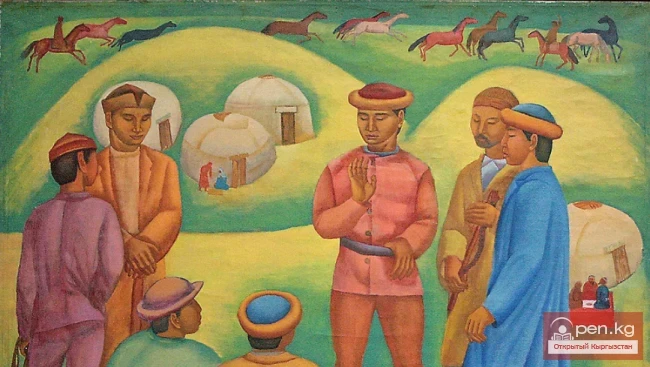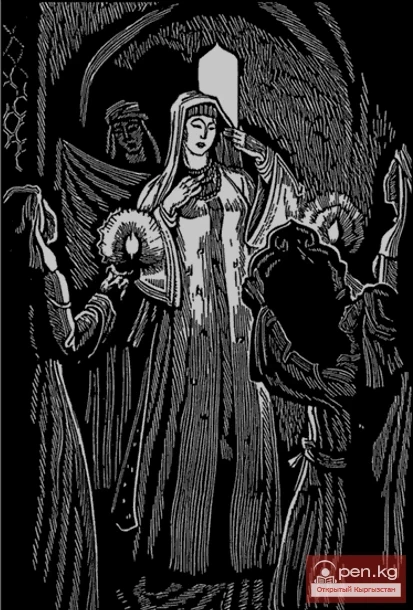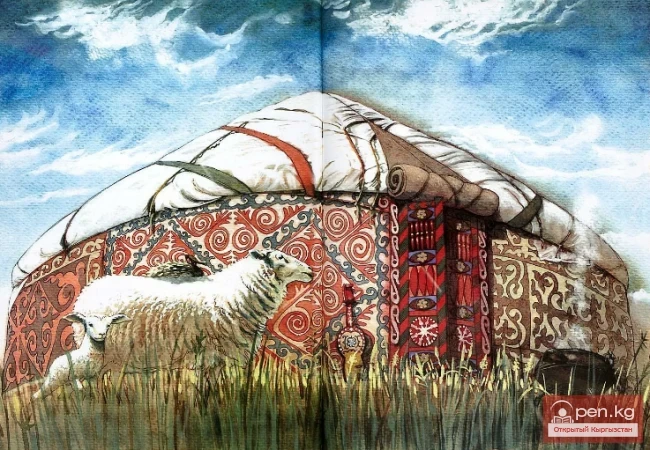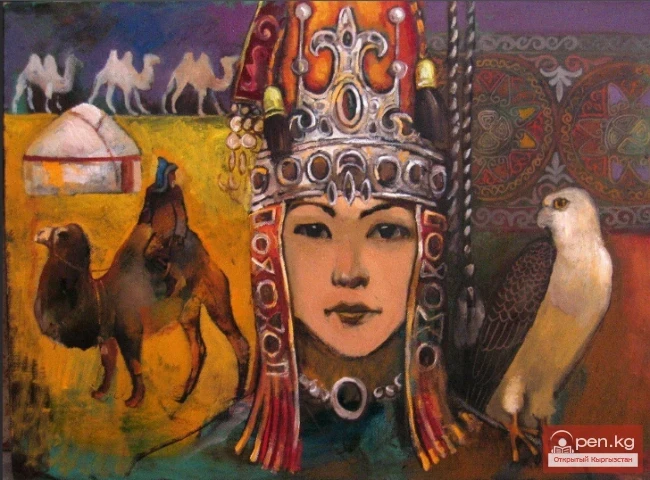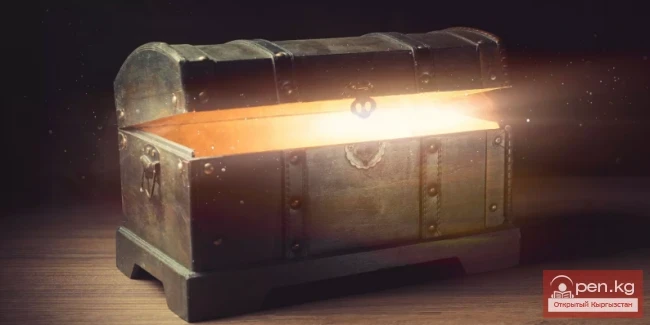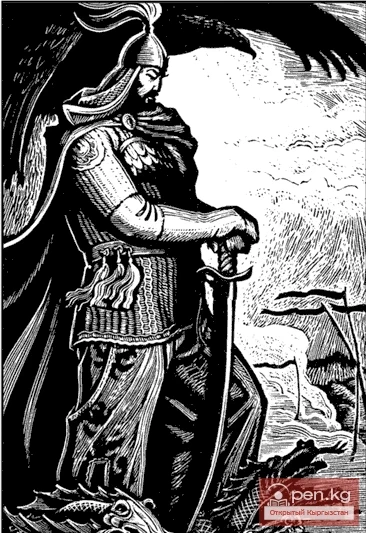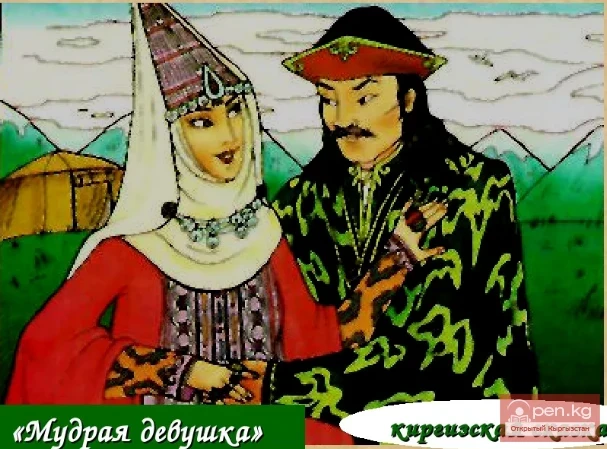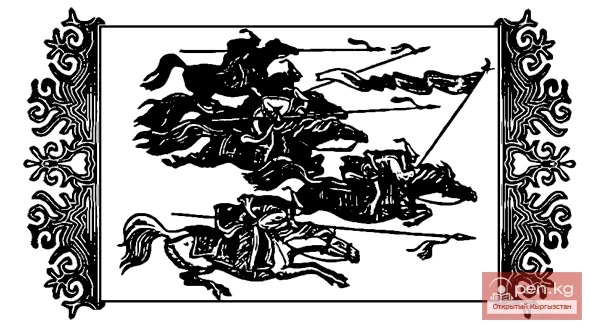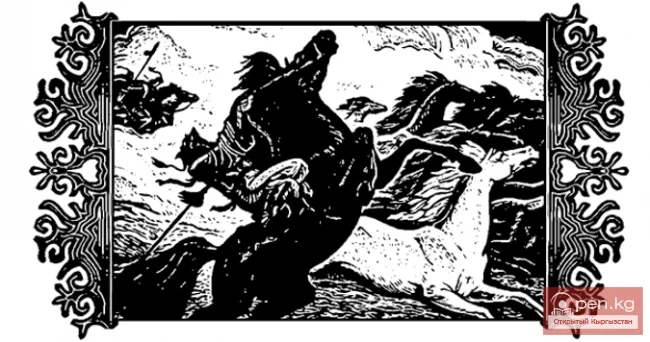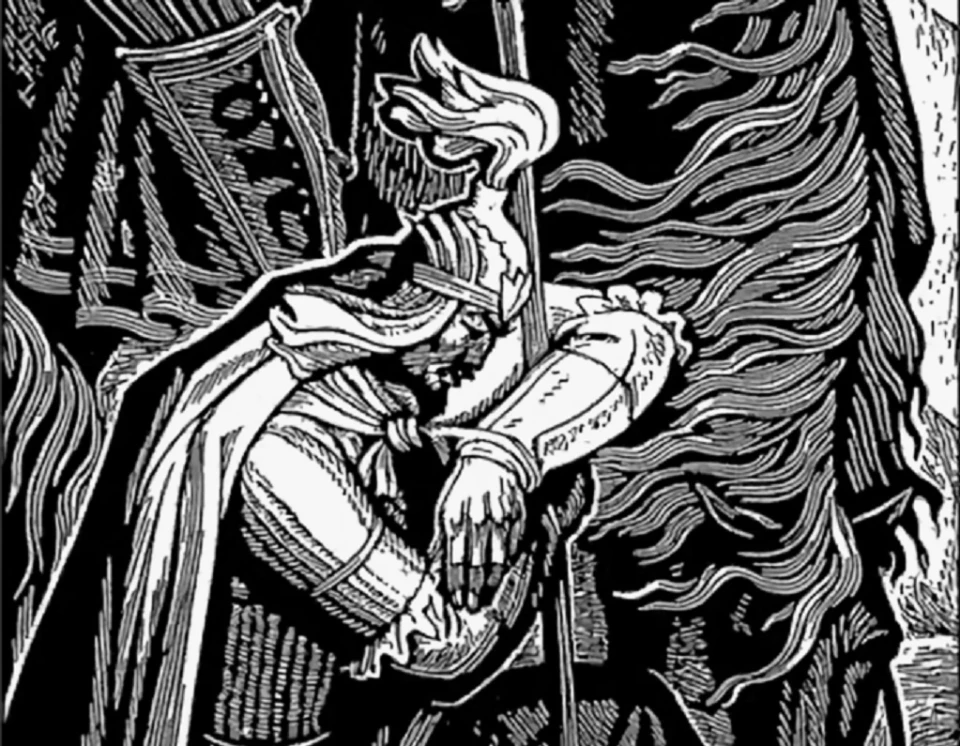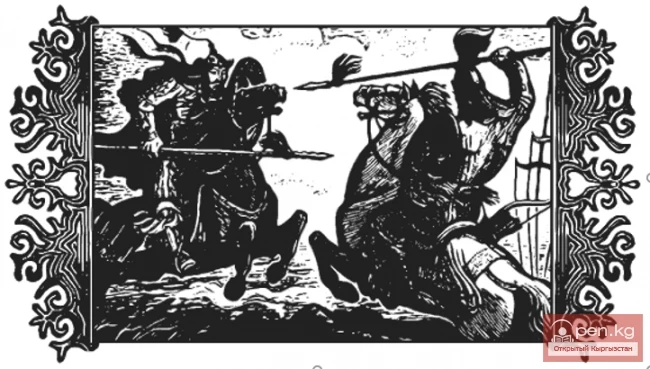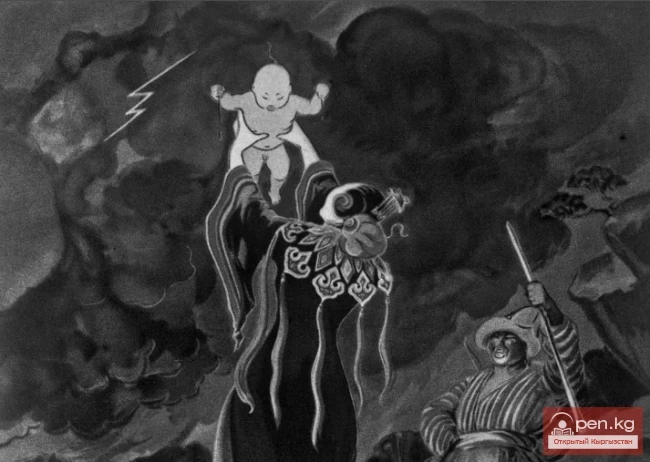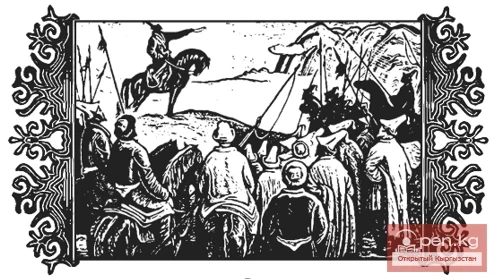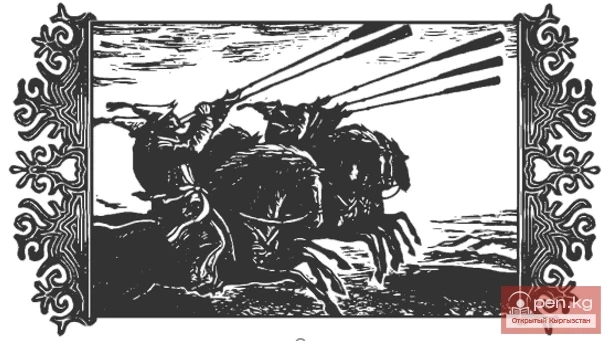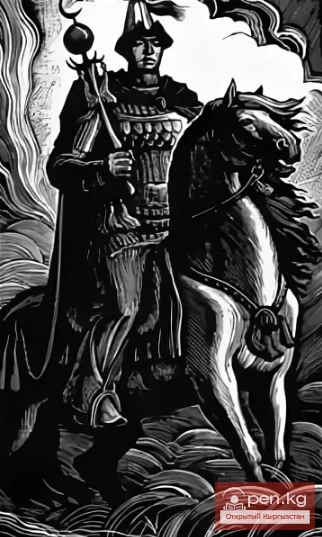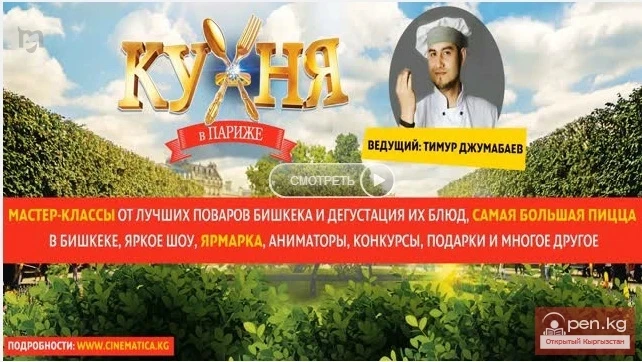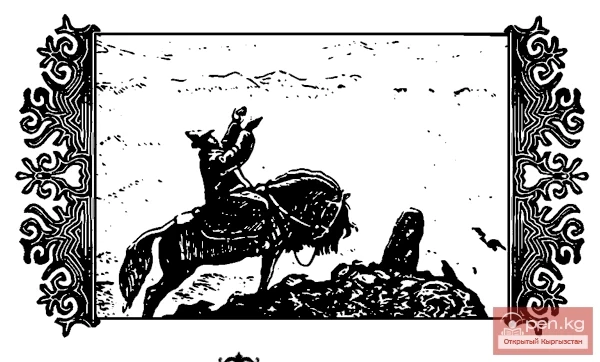
The Birth of the Hero
Hey!
Jakyp, my brother Chiyr
Suddenly left for another world.
His wife — the beautiful Shakan
Remained a young widow.
So Jakyp went then
With a bow to Shakan's relatives.
He promised her a good life,
Persuaded her and took her as a wife,
Arranged an unprecedented wedding.
(The young widow, it seems,
Was so beautiful in herself).
And in memory of his brother, the rich Jakyp
Gave his wife the name Chiyrdy.
One night Chiyrdy
Asked her husband:
— Tell me, what are you grieving for?
I see tears in your eyes.
Thousands of cattle in the herds,
Grains piled high in the granaries,
The fate of your relatives is in your hands.
Or maybe a new misfortune
Has come upon us?
Then Jakyp said to his wife:
— Let the flocks and herds perish!
All that I have earned through my labor,
To whom will I leave it as inheritance,
When I die, all this junk?
And what of your wealth and power,
If there is no offspring after you,
To enjoy life to the fullest?
Why was I born? Why did I live,
If I could not,
Leave my own blood to live?
— Or maybe, old man, we should take
A wife for you — a second one?
Let her bear us children!
We will raise the little ones
And look after you together! —
Chiyrdy said to her husband.
— In the Altai region here lives
Only one Kyrgyz clan.
Among us, not even seven generations
Have passed without mixing with anyone.
And if we mix our blood,
A fool or a monster will be born!
Around us are Kalmyks and Manju,
Chinese, Chukchi, and Khanty,
Where will you find me a wife? —
Jakyp asked Chiyrdy.
To live in peace and harmony, like sisters, without showing unseemly jealousy, the younger wife — tokol in everyday conditions, was usually chosen by the elder wife — baibiche. And Chiyrdy, along with her husband's relatives, went in search of a bride. She traveled to nearby villages and chose the daughter of a wealthy Kalmyk, the beautiful Bakdolet. The Kyrgyz arranged a lavish wedding, paid a large kalym, and became related to the Kalmyks.
And now the fourth year has passed,
As rich Jakyp awaits a child.
But Bakdolet does not give birth!
And Jakyp began to grieve again,
That God has not given him
An heir — his own blood.
— Everyone has daughters and sons,
But I live alone like a finger,
Though I have been married for many years.
My house resembles a tomb,
The sounds of children are not heard.
Why accumulate wealth? —
The old man grieved more and more. —
When I take my last journey,
And my relatives come to see me off,
No one, shouting "My father!",
Will run after me in tears.
Who will feed, water, and train
My hunting birds,
And who will protect the camp
With a spear and a bow?
Will our clan,
Once on its feet, scatter around the world?!
Why do I have two wives,
If they are both barren?
Hearing these bitter words,
Chiyrdy began to cry:
— Your unfortunate wife,
It seems, was created for grief.
And I have long accepted that
God has denied me a child.
You see, I am already old,
I have lived almost half a century.
Then tell me, why
Can Bakdolet not give birth —
Your younger wife?
Pampered and young,
She lives, holding her nose high,
As if a bunch of sons
Has been brought into your house by her skirt!
— But I, dear sister,
Came here a bit later, —
Bakdolet appeared right then. —
So why in your youth did you
Carry your skirt empty?
(It was empty for the widow too!)
And why, tell me, does the fruit
Not grow in your womb?
I am waiting, sister, for my turn! —
With a capricious toss of her head,
Bakdolet left the yurt.
Hearing the words of the tokol,
In which there was truth,
The baibiche fell down on the felt,
With bitter sobs.
Well, then, coming to her senses,
She raised her hands to the heavens
And through the tündük above her head
Prayed to her God:
— Hear me, Koke-Tengir,
And give health to the old man!
Return my youth to me!
I would give my life, my mind,
If only a living fruit were born.
Send conception to Bakdolet,
The foolish, young beauty.
If we are sinful before you,
Forgive us all, my Creator!
I will give you everything as a sacrifice,
But just give us a child!
In tears, Chiyrdy fell asleep,
And she saw a prophetic dream:
An old man appeared to her
And said in a kind voice:
— The Almighty Tengir has commanded,
So that no one sheds tears.
Then he handed you
This apple. Eat it! —
Said the old man and instantly disappeared.
As soon as she tasted the sweet fruit,
Her belly swelled.
And under her saddle was not a horse,
But a dragon breathing fire!
The baibiche woke up in fear,
But could not understand
The meaning of the dream she saw.
Then Jakyp suddenly woke up
And joyfully said to his wife:
— Old woman, do not grieve anymore!
God himself will free us from suffering.
I just saw a prophetic dream.
Let’s gather all our relatives,
Maybe someone among them
Will find the meaning of my dreams.
And then, bowing, suddenly entered
Jakyp's younger wife:
— Forgive me, old man! Forgive me, sister,
For not waiting for my turn,
I entered the elder's yurt.
But I had a wonderful dream!
You are hunting, our old man,
And on your arm sits
A beautiful falcon Ak-shumkar.
Spreading its powerful wings,
It rushes into the sky.
And nearby on the ground sit
By the yurt two young falcons,
Looking with jealous envy
At the flaps of their brother.
And then Chiyrdy said:
— For how many years, Jakyp,
The Creator has not given you children.
Or maybe Koke-Tengir himself
Has punished you for greed?
Tonight, all three of us
Saw a good dream.
Invite everyone over, do not be stingy,
Relatives, neighbors, and friends,
Do not forget the Manju and Kalmyks,
Slaughter more horses!
Let everyone come to our feast
And eat plenty of meat,
Bless us for happiness.
And we ask you, with my sister:
Hurry and invite everyone to the feast!
From the native land to Altai
Forty yurts of Kyrgyz came,
Now there are seventy, count:
The youth has married off,
They have had children.
Jakyp slaughtered for the guests
Nine selected horses,
A hundred rams, seven cows
And two camels as a sacrifice —
Such generosity from him,
It seems, no one expected.
(Jakyp had been stingy since birth).
— He slaughtered so many! Oh dear! —
The guests whispered among themselves.
When they ate beshbarmak
(One tavak for four people),
The host gathered all the guests
And told them the dream in detail:
— Suddenly a hawk landed on my tündük
And let out a battle cry.
He spread his wings in golden feathers
With a powerful sweep.
And the keen hawk's eye
Shone with burning fire.
And his beak gleamed like steel,
And his claws were sharp as a dagger.
I tied long ropes for him
From silk threads.
And then from somewhere in the sky
A falcon flew to the tündük,
Folded its wings and sat down beside.
Whoever solves this dream,
Will be generously rewarded.
Or maybe will inform us
When my hawk will arrive.
And the poor baibiche
Had a mysterious dream:
She tasted the sweet fruit,
And then her belly cracked.
Then, having saddled the dragon,
She rushed back to her native land.
What could this mean?
My second wife — the tokol
Had a dream that same night:
As if two young falcons
Flew straight into her yurt.
And Bakdolet pressed to her chest
Warm chicks.
What could this mean?
No one could understand all these dreams
And interpret them properly.
And finally, as always,
The wise Akbalta rose:
— Jakyp, you saw a prophetic dream,
It seems, it will come true in life.
And if you took the hawk,
Then God has sent you a son —
About whom you have dreamed for so many years.
A warrior will be born, a glorious son,
He will be a mighty ruler.
And if you tied him to the yurt
With a strong rope,
Then know, your descendant
Will be the support of the clan.
And if your baibiche
Suddenly saddled the dragon,
Then your mighty son
Will unite all Kyrgyz from foreign lands
And brothers will be together.
And your son will protect
The people and the land from enemies.
Learning the meaning of the prophetic dreams,
Jakyp cried like a child.
Then the wise Akbalta remembered
About the two similar young falcons,
That the tokol had seen:
— That means that the Creator will send her
Two strong sons!
And all those whom Jakyp called
Raised their hands to the heavens,
Praying that the Creator himself
Blessed Jakyp's wives
And all that they saw in the dream,
He fulfilled in reality.
In labor, days and years flew by,
The meadows changed their carpets,
The gardens bloomed twice —
And now everyone around knew,
That Chiyrdy was expecting a child.
And she craved to eat
Not game, not sweet ejigei,
But the heart of a tiger! Kill me!
Day and night she nagged,
Jakyp had no peace or sleep.
The shepherd Badal suddenly reported,
That somewhere a certain merghench
Had shot a big tiger.
— Here, take this gold ingot,
Quickly find the hunter
And bring me the heart of the tiger! —
Chiyrdy trembled.
Badal found the hunter —
And immediately exchanged the gold ingot
For the heart of the tiger.
And the baibiche boiled the tiger's heart
In boiling water,
Ate her fill and to her heart's content,
Laid down to sleep peacefully.
And nine months later
The elder began to have contractions.
Driving the gray mare,
They brought her as a sacrifice for childbirth.
From the center of the yurt, on the tündük
They nailed a golden banner.
And holding onto it with her hand,
Chiyrdy groaned in labor:
— Save me! Koku Alat!
Has death really come to take me?
And the healer — the kindik ene
Could do nothing to help her.
— It seems, this cruel fruit
Will kill the mother with birth.
And the stingy Jakyp
Will live alone with the young Bakdolet! —
Cried the baibiche in tears.
And for exactly seven nights and days
She suffered, not closing her eyes.
And now the very hour has come,
When the poor Chiyrdy
Was supposed to give birth.
The neighbor's wife Berdike
Took it upon herself to receive the child.
And then the old woman Akbalta
Managed to inform the rich man,
That the baibiche was about to give birth.
When Jakyp learned this news,
He cried, and then said:
— I am ready to give forty strong horses
As a gift for the joy.
And if I suddenly find out,
That I have a son,
I fear that the old man's heart
Will burst with such joy.
I do not want the people
To see a shameful death.
I will better go to the mountains
And wait for good news.
But if a daughter is born —
Let no one come to me.
And if a son — come to me riding
And take your gift!
On the slopes of the mountains, he saw
His herds, sheep, and goats.
The stallion named Jorgoboz
Was watching over the herd.
The gray mare lay down here,
Preparing to foal.
“If she gives birth to a colt,
I will name him Aymanboz.
Just let God allow my wife
To give birth to an heir!
Then I will give this horse
To my own son.”
And he had no sooner thought it,
Than the mare's groans suddenly ceased.
It seems, the poor thing has given birth!
And the rich man hurriedly dismounted.
Let’s leave the old man in the mountains,
Let him stay with the herd for now,
Let’s see what is happening with the baibiche.
No one had ever heard,
That anyone's wife
Could not give birth for eight days and seven nights.
Twelve healers, groaning,
Pressed on her belly until
The water flowed from her womb —
And then the fruit came out!
He cried out loud,
In his clenched fists
He held a handful of blood!
— Well, who is it? A boy or a girl?
Tell me, women, quickly! —
The mother cried in hysteria.
When she saw the little one —
Though a child, but a male sprout,
Chiyrdy stopped breathing,
Her heart stopped beating.
Everyone began to cry in panic.
But then she came to her senses:
— I do not believe my eyes!
I want to check once more,
Who I gave birth to, a son or a daughter,
Without closing my eyes!
And you, wife of the dambyldy,
Quickly cut the umbilical cord! —
Chiyrdy cried out in happiness.
And Kanymjan wanted to take
The child to swaddle him,
But he suddenly jerked his shoulder, God forgive,
Like a hero of thirty years!
— What, you foolish one, could not
Swaddle the little one! —
Bakdolet said out of anger.
But the rich man's tokol herself
Could not lift the child.
— It seems, the Creator has sent us
A mighty hero! —
And she put two or three drops of oil
Into the mouth of the infant.
The baibiche took the child,
Gave her son her breast —
Milk flowed in streams.
As she gave her breast to the child again,
Blood flowed from her nipples.
From fear and pain, all in blood,
Chiyrdy almost died.
Let’s leave her with her son here —
We will find out the news about the old man.
The old and young rushed to the mountains
To search for the old Jakyp,
To snatch the rich gift
For the baibiche's son.
Sulayka returned home,
To check on the old man,
And in the yurt, Akbalta alone
Sits and looks at the fire.
— What, old man, have you gone deaf?
Did you not hear from the people:
Stingy Jakyp is ready to give
Forty horses for a son?
Take at least one horse from your brother!
Are you not good for this? —
The wife trembled with anger.
In anger, Akbalta looked
At his old wife:
— Fear God, Sulayka!
Here live different people,
There are many slaves and rogues here,
On the slopes, they graze someone else's cattle,
Hungry and without shelter.
Where will I run with them?
And what will I get from them?
To rush to the mountains on horseback,
Old woman, I do not have the strength!
For a whole week without sleep
You helped her give birth,
And what reward did you manage to take?
— Here are my gifts! —
Said the baibiche to her husband,
Carelessly throwing before him
Two chapans and an elechek.
The poor Akbalta had to
Saddle the horse Kekcholok,
Barely holding on in the saddle,
To ride to Jakyp's summer pasture.
And at that time, rich Jakyp
Was washing the foal by the mountain river,
Removing the afterbirth and slime from it.
He cleaned its nostrils, ears, and mouth,
Set it on its feet — and here
The foal rushed to the udder.
And Akbalta shouted:
— Oh! Suyunchi, brother, suyunсhi!
Your old wife
Brought a lion cub in her skirt!
Jakyp, hearing this news,
Almost lost consciousness.
— For the good news, I give you
A gold ingot,
Plus forty horses!
Take it, Balta, and quickly
We need to go to Chiyrdy.
And to my son, named by me,
You will immediately be a father!
And, like a young man, jumping into the saddle,
Rich Jakyp rushed home,
Where his own son was waiting for him.
Holding the infant in his arms,
The baibiche came out to meet him.
When the father saw
His own son and wife,
He fell to her feet in tears,
Like before the Goddess Mariam.
— Let me die here now,
My God, I thank you! —
The happy rich Jakyp cried
And pressed his son to his heart.
And in honor of the baby's birth
He arranged a luxurious feast.
He summoned guests from all sides:
From the Ural mountains to the Irtysh,
From the east, where China lies,
From Tibet, he summoned relatives.
Hanging his family banner,
He dug seven hundred hearths,
And seventy Kyrgyz yurts
Boiled meat in cauldrons.
And they sat at one tavak
Manju, Chinese, and Kalmyk,
The steppe Mongol, the native Kazakh.
Days will pass, years will go by,
Who was with Jakyp then,
Will never forget!
When the feasts were over,
The tournaments, games, and wrestling,
Jakyp called the guests to himself —
Ordered to name his son.
Everyone began to think and guess,
What name to give.
But no one of the wise men
Could name the boy.
And suddenly a wanderer with a beggar's staff came to this feast:
— Let the first sound be "Ma" —
The beginning of the word "Muhammad".
The messenger of God and prophet,
He calls humanity
To be pure in soul and body!
Let the second sound be "En" —
The initial sound of the word "Noah".
He is good in the holy Bible.
When the flood reached us,
He saved all the living from death!
The end will come from the word "Sin" —
A mighty lion, invincible.
"Your God is yourself! — said Buddha. —
The scales on your two shoulders,
To be pure in your deeds,
Always weigh your actions!"
And together it will form "Manas".
Let’s name the son Manas!
And this name, like granite,
God will keep for a long time!
And three times shouting "alas",
Giving the baby the name "Manas",
The stranger instantly disappeared from sight.
When all the guests dispersed
And the brothers gathered together,
The wise Akbalta said to them:
— Recently, a message came to me:
Our enemy — the sly Esenkhan
Learned from the seers
That in our tribe
A hero Manas will be born.
He will unite the Kyrgyz,
In battles, he will defeat all enemies,
He will go on a campaign to China,
And destroy eastern Beijing.
The treacherous Esenkhan ordered
To search for children named Manas
And kill them immediately.
And therefore, I ask you
To use cunning and deceit:
Do not call the baby Manas.
Until the boy grows up,
Let him be called "Big Fool".
But when he grows up
And takes a shield and sword in hand,
We will return his true name
And call him Manas again!
And to the relatives, a command was given,
That this boy is not Manas —
They call him Big Fool!
Epic "Manas". The Tale of the Destruction of the Kyrgyz by Alooke Khan
